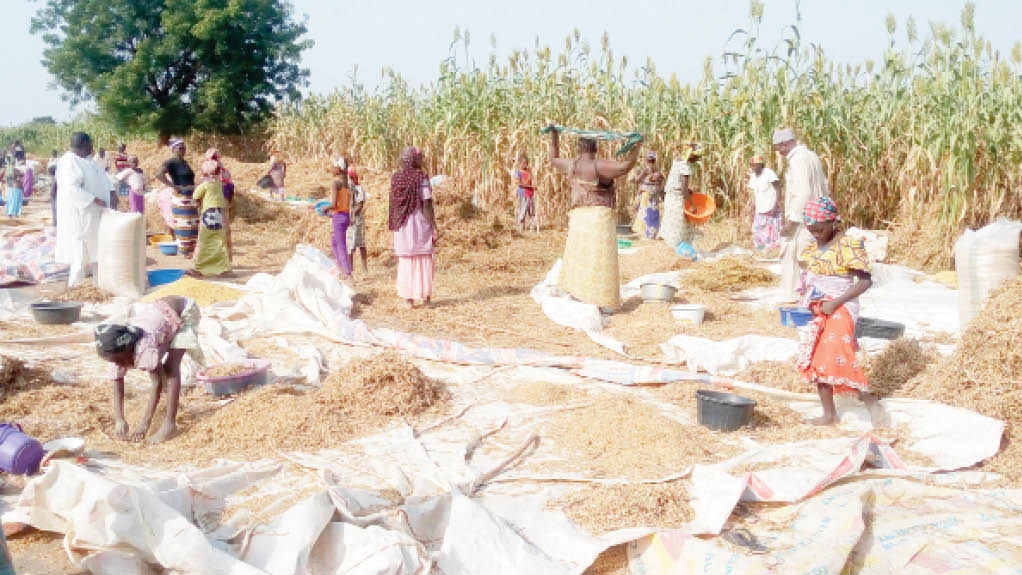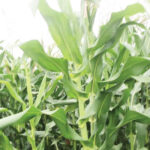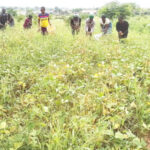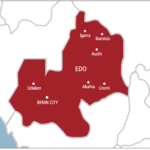One of the most difficult challenges that confront farmers in Nigeria is access to funding to finance their operations, a situation that makes many of them to remain at subsistent level.
The Central Bank of Nigeria (CBN), for example, has several funds set aside for farmers to access through commercial banks, but many of them complain that the conditions set by those commercial banks are so rigid that they cannot access it.
- Banditry: Coalition asks Kebbi to establish security outposts in schools
- Empowerment programmes for Nigerian women: So far, how far?
In 2009, the Central Bank of Nigeria (CBN) established the Commercial Agriculture Credit Scheme (CACS) to provide finance for the country’s agricultural value chain (production, processing, storage and marketing). The scheme is a sub-component of the federal government’s Commercial Agriculture Development Programme (CADP) with a N200billion bond raised by the Debt Management Office (DMO). Loans to eligible entities under the scheme are disbursed at a maximum interest of 9 per cent.
There was another N50 billion Agricultural Credit Support Scheme (ACSS) introduced to enable farmers exploit the untapped potentials of Nigeria’s agricultural sector, reduce inflation and lower the cost of agricultural production.
Recently, to address the food security and youth unemployment challenges across the country, the CBN introduced the Accelerated Agriculture Development Scheme (AADS) to engage 370,000 youth in agricultural production, in collaboration with state governments. According to the CBN, “the Private Sector-Led Accelerated Agriculture Development Scheme (P-AADS) was also developed to complement the AADS by exploring private sector partnership to facilitate more rapid land clearing for production of key agricultural commodities.”
Decades ago, the apex bank, in collaboration with the military government of Gen Olusegun Obasanjo, established the Agricultural Credit Guarantee Scheme Fund (ACGSF) by decree 20 of 1977. The federal government holds 60 per cent and the CBN’s 40 per cent of the shares. The capital base of the scheme was increased to N3billion in March 2001.
In 2015, the CBN, through NIRSAL, under the Anchor Borrowers’ Programme, had sunk over N600billion into the sector, but many farmers were skeptical of those who got the loan as ‘briefcase farmers.’
Getting funding from commercial banks outside the CBN funds has not been easy either, as farmers said they were the most difficult to deal with. And where there is an offer, the interest rate is ridiculous and can impoverish the farmer instead of lifting him up.
Insurance organisations and their policies have not been in favour of the farmers either, as some of them who took policy to cover the loan they got had better experience.
Mr Musa Labaran Wamba of the Federation of Agricultural Commodities Association of Nigeria said, “Truly speaking, accessing funds from the banks for farming activities in this country is still a very serious problem as most of the banks will always tell you that they don’t fund agriculture-related activities in their operational policies, and even those who may accept that they do will always place very difficult terms and conditions, like you have to open and manage an account with the bank for a period of not less than six months to enable them assess your capacity for the said facility; and in this process, the farmer hardly qualifies for the facility due to some unjustifiable reasons.
You will agree with me that if a farmer had enough money to run an account to the bank’s satisfaction before qualifying for the facility, why not use the same money to fund his farm project directly?
“In some cases again, the interest rate of the banks is enough to make the poor farmer poorer than he came to the bank. In the event that the bank decides to grant such facility, the disbursement timetable is another problem because such facilities may be disbursed when the farming period of that particular commodity might have been over. Another problem is the kickback demand syndrome by the bank staff themselves. No facility is ever granted without a kickback by bank staff.
Mr Dele Olorunfemi said most farmers have not been able to access the funds because of the bureaucratic procedures involved. A lot of CBN licensed training centres are just collecting money from farmers alike for training and preparation of feasibility study, which at the end might not result to any money being released by NIRSAL Microfinance.
“You must have influence or someone’s introduction to get it through. The commercial banks are also not helping matters except you are known or ready with collateral to get theirs at their high interest.
“The licensed training institution that trained me after payment gave me the training certificate and the loan form to fill, which was submitted to the CBN-controlled NIRSAL Microfinance. I had interview with the microfinance bank since last year but no news from them till now. Imagine what farmers must be going through if l of the Federal Ministry of Agriculture and Rural Development (FMARD) experienced this. I had to pay N10,000 for feasibility study and N5,000 to N10,000 for the training. All these have almost entered voice mail now,” he said.
In Benue State, our correspondent spoke to a number of farmers like Vitalis Tarnongu, who outlined several reasons responsible for the endless battle by farmers to access credit despite many financial windows.
Tarnongu said Nigeria was made up of mostly smallholder farmers who are mostly not literate about the existence of these credit facilities, while portfolio farmers usually hijacked such opportunities, thus depriving real farmers.
He added that the checklist for accessing the credit facilities were not usually friendly to smallholder farmers, stressing that where a farmer would be required to provide collateral in form of a landed property with certificate of occupancy in a capital city to access N1million is highly discouraging.
He further noted that commercial banks that are usually the disposals of the credit facilities were not ready to deal with smallholder farmers for fear of risk.
Similarly, another farmer, Charles Iordye, who is the chairman of the Sesame Farmers Association in the state, said it had been a hurricane task for them to access credit facilities.
He said, “We find it very difficult, and at the end not having it at all because the conditions given to farmers by financial institutions are too much for them to meet up.
“At times the conditions are met, but the financial institutions get to farmers late, making the programme useless. The insecurity in our areas also hinders financial institutions from accessing our farms for aggregation.”
In Plateau State, farmers have different tales in respect to accessing credit to boost their activities.
For Dayyib Zachariah Adam, who is the chairman of the farmers association in Gengere ward of Jos, the state capital, said that since 1991 (over 30 years now) when he began farming, he had never gotten any credit to support his activities.
Adam said he was even asked to mobilise his members in that regard, which he did, but till date he never heard from them again.
On his part, however, the secretary of Tomato Farmers Association in Barkin Ladi Local Government Area, Auwal Tanko Haruna, said they had been accessing credit at the local government level from time to time and other times at the state level.
He explained that they often got the credit at a single digit interest, adding that even GIZ (a German corporation) also facilitated credit assessment for them.
In Kano, a 48-year-old Malam Ubale Bunkure revealed that he produced over 80 bags of millet annually in his 17 years of practice as a farmer, but he had never accessed any finance from the government or any agency. He added that even the much popularised Anchor Borrower intervention failed to include millet farmers.
Similarly, a Kano-based wheat farmer, Alhaji Jibrin Buba Bello, said that for over three years, the little intervention of improved seeds coming through the Lake Chad Institute stopped coming. He claimed that as a farmer who believes in wheat farming, for 10 years he had been practising with resources he sourced personally, adding that even the banks were not forthcoming to assist an average farmer.
A poultry farmer, Malam Rabi’u Ibrahim Kumbotso, also said that poultry farmers had been left on the mercy of nature and personal financing. According to him, as important as poultry farmers are, no government intervention has a flair for them. He added that even at the trial moment of poultry farmers, such as the bird flu outbreak, they were left to face their trouble alone.
By Vincent A. Yusuf, Abuja, Hope Abah Emmanuel, Makurdi, Dickson S. Adama, Jos & Ibrahim Musa Giginyu, Kano

 Join Daily Trust WhatsApp Community For Quick Access To News and Happenings Around You.
Join Daily Trust WhatsApp Community For Quick Access To News and Happenings Around You.


